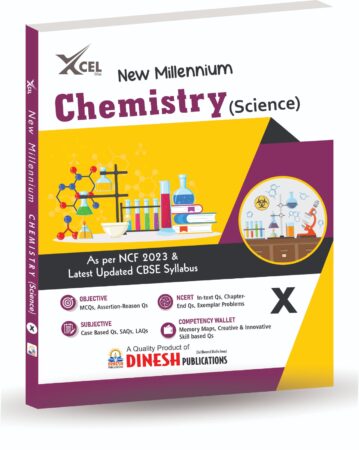- Status: outofstock
New Millennium Chemistry (Science) for Class 10 (2024-2025 Session)
Product Details
- Class:10
- Book Type:CBSE Textbook
- Format:Paperback
- Pages:342
- Edition:January 2024
- Language:English
- ISBN13:9789391360573
Product Description
FEATURES: Objective: MCQs, Assertion-Reasons Qs Subjective: Case based Qs, SAQs, LAQs NCERT: In-Text Qs, Chapter-End Qs,
Exemplar Problems Competency Wallet- Memory Maps, Creative & Innovative Skill based Qs.
New Millennium Chemistry Book for Class 10 as per NCF 2023 & Latest Updated CBSE Syllabus
The book has been made strictly as per new NCERT book and CBSE syllabus 2023-24.
The text in the chapter is well classified and elaborated as per the requirement. Moreover, the chapter covers a vast question bank including solved and unsolved questions. New Millennium Chemistry Book for Class 10 incorporates all the Article Section-wise Questions (Solved Subjective Questions, MCQs, Assertion-Reason Type Questions, Case Based/Source Based Integrated Questions and Practice Questions Set). Miscellaneous Exercise (Solved) Questions, (Competency Based Questions, NCERT Corner In-text Questions and Chapter End Exercise. NCERT Exemplar Problems, Multiple Choice Questions, Short Answer Questions and Long Answer Questions). For recapitulation of the concept Mind Maps for Memorising and Examination Corner is given in each chapter. Experimental investigations are also incorporated in the text comprehensively wherever required. This book will provide a solid foundation of knowledge of the syllabus and will be an invaluable learning aid for the students.The goal of this book is to enhance the academic, competitive and practical skills in the students and help them to prepare for their Board Examination. The entire content of the book is presented in a methodical way that is easy to understand and access.
Here are some Advantages of using NCERT books New Millennium Chemistry Book:
- New Millennium Chemistry Book for Class 10 helps to learn concepts and strategies easily.
- This book is very helpful for students to revise concepts.
- This book is published strictly according to NCERT and CBSE Guidelines.
- New Millennium Chemistry Book for Class 10 is designed as per NCF 2023 & Latest Updated CBSE Syllabus.
- Every single concept is covered thoroughly.
- You don't have to read every single chapter of each textbook.
- You get to focus on the subjects which you need more knowledge about.
- All concepts are well explained with illustrations and examples.
- The Dinesh Publication books Ncert based Grandmaster Xcel series are best for scoring well in the Final Examination and getting a higher rank.
Syllabus for Class 10 Chemistry 2024-25 Central Board of Secondary Education
Theme: Materials
Unit 1: Chemical Substances - Nature and Behaviour Chemical reactions: Chemical equation, Balanced chemical equation, implications of a balanced chemical equation, types of chemical reactions: combination, decomposition, displacement, double displacement, precipitation, endothermic exothermic reactions, oxidation and reduction.
Acids, bases and salts: Their definitions in terms of furnishing of H+ and OH-ions, General properties, examples and uses, neutralisation, concept of pH scale (Definition relating to logarithm not required), importance of pH in everyday life; preparation and uses of Sodium Hydroxide, Bleaching powder, Baking soda, Washing soda and Plaster of Paris.
Metals and nonmetals: Properties of metals and non-metals; Reactivity series; Formation and properties of ionic compounds; Basic metallurgical processes; Corrosion and its prevention.
Carbon compounds : Covalent bonding in carbon compounds. Versatile
the nature of carbon. Homologous Nomenclature of carbon compounds containing functional groups (halogens, alcohol, ketones, aldehydes, alkanes and alkynes), difference between saturated hydrocarbons and unsaturated hydrocarbons. Chemical properties of compounds (combustion, oxidation, addition and substitution reaction). Ethanol and Ethanoic acid (only properties and uses), soaps and detergents.
Book Author Dr. Sourabh Monga M.Sc., Ph.D. CSIR-UGC (NET) Published by Dinesh Publications - Publishers of New Millennium & Xcel Series





